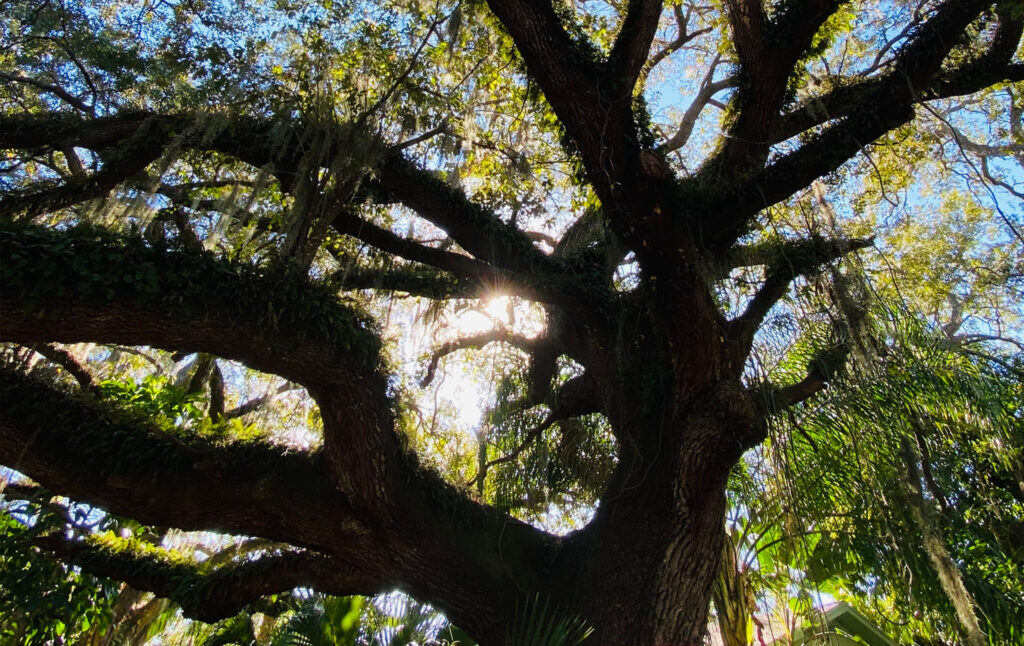
Obliterating the Natural World
The radical (but common) right-wing belief that property rights trump all other rights leads inexorably to the destruction of natural wonders.
My parents’ neighborhood is full of shady old oak trees. They are majestic and ancient and they keep the streets cool. In many Florida housing developments, there are hardly any trees at all, so when you walk down the street on a hot summer day (or increasingly, a hot winter) you feel as if you are boiling alive. Walking under a beautiful canopy of oaks is a much more pleasant experience for us humans. Numerous other living things also benefit from these trees, which form the backbone of the local ecosystem..
Because oak trees are remarkable living things, cities have long placed restrictions on what you can do to them. Developers who would like to destroy some quaint patch of nature often found that they were barred by regulation, and people could not just destroy the trees on their property if the city had protected them. But Florida now has a Trumpian Republican governor, Ron DeSantis, and things are a little different under Republican rule. In 2019, DeSantis signed a new law prohibiting cities from restricting what property owners can do to their trees. So long as an architect or arborist hired by the developer calls the tree a “danger,” the owner of the property can do what they want with it.1
This is part of the Republican Party’s never-ending war on “regulation.” In the right-wing theory of freedom, it is illegitimate for the government to tell property owners what they can do with their property. If the government prohibits building on land with a historic oak tree on it, the government is effectively devaluing the land, and a person’s right to maximize profits from their property is considered sacrosanct. For the more extreme libertarian (or, more accurately, propertarian) Republicans, such regulations are tantamount to the government stealing from people. If you require me not to chop down a tree, and therefore force me to forgo the money I would get if I did chop the tree down, you are no better than a thief.
Now, then, thanks to DeSantis and the Florida Republicans, the question of whether a centuries-old oak tree survives comes down to whether a developer can make more money by keeping it or by cutting it down. The free market will decide the trees’ fate. And the market does not place a particularly high value on the lives of trees. Consider this beauty in my parents’ neighborhood:
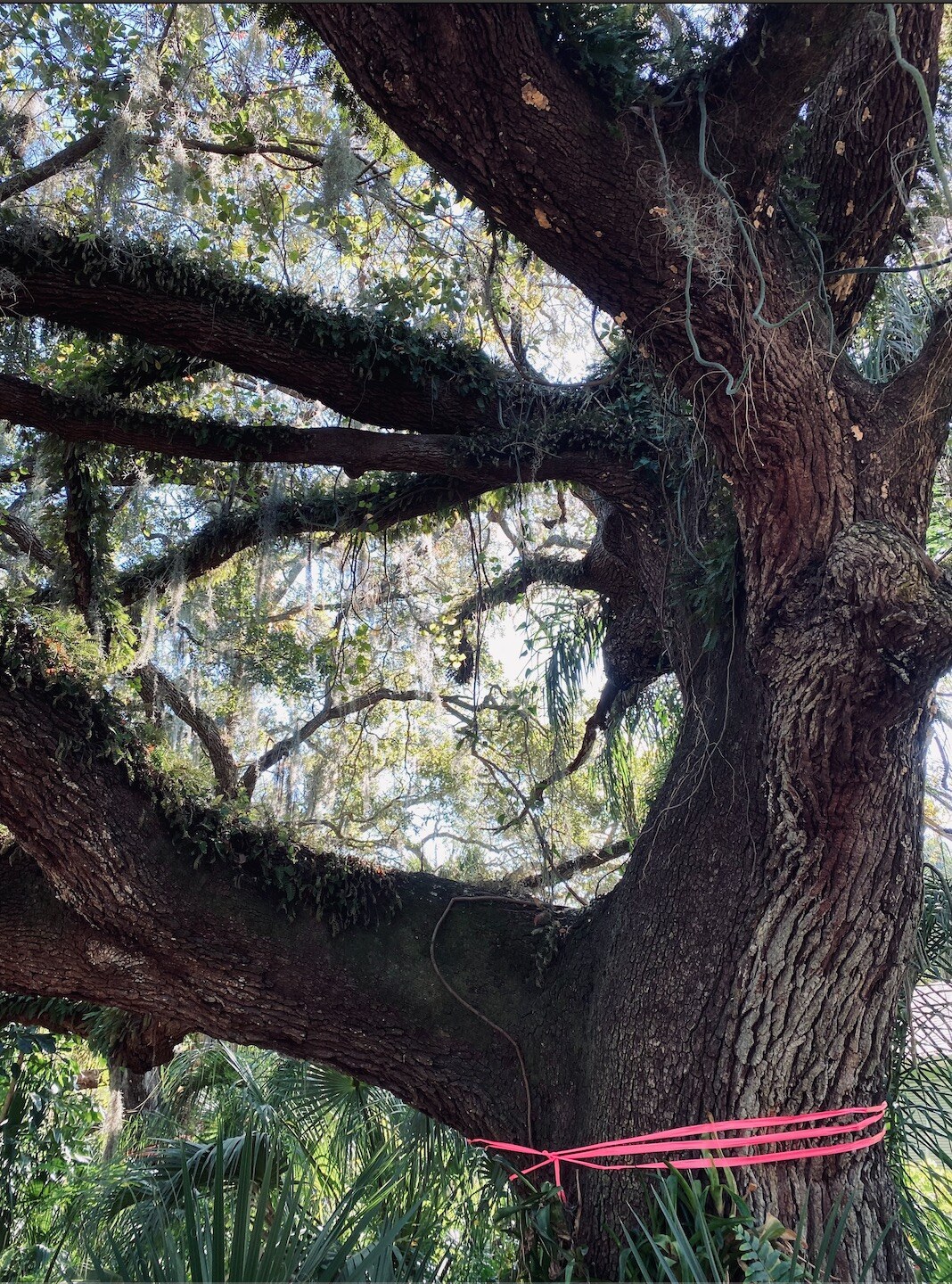
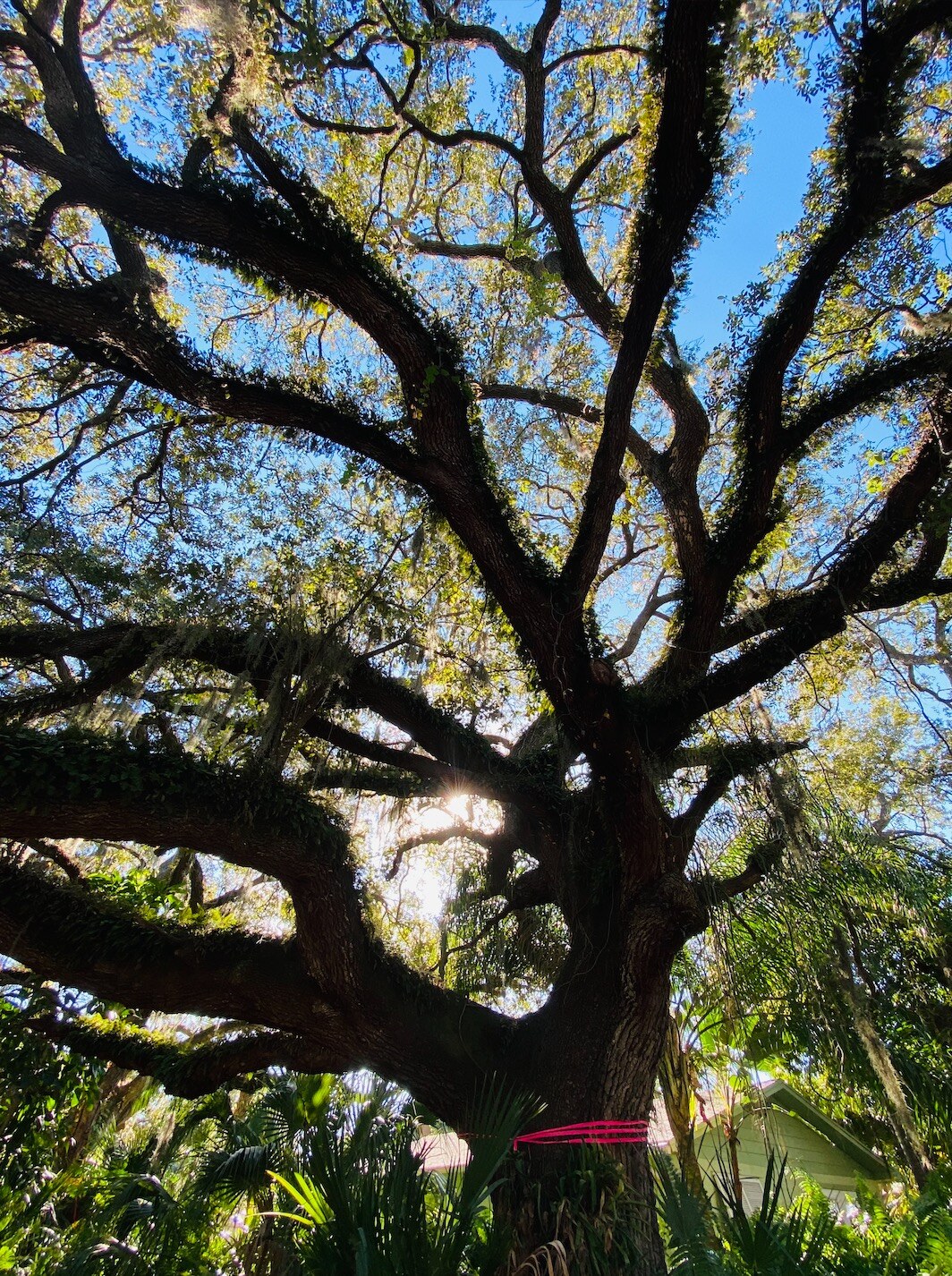
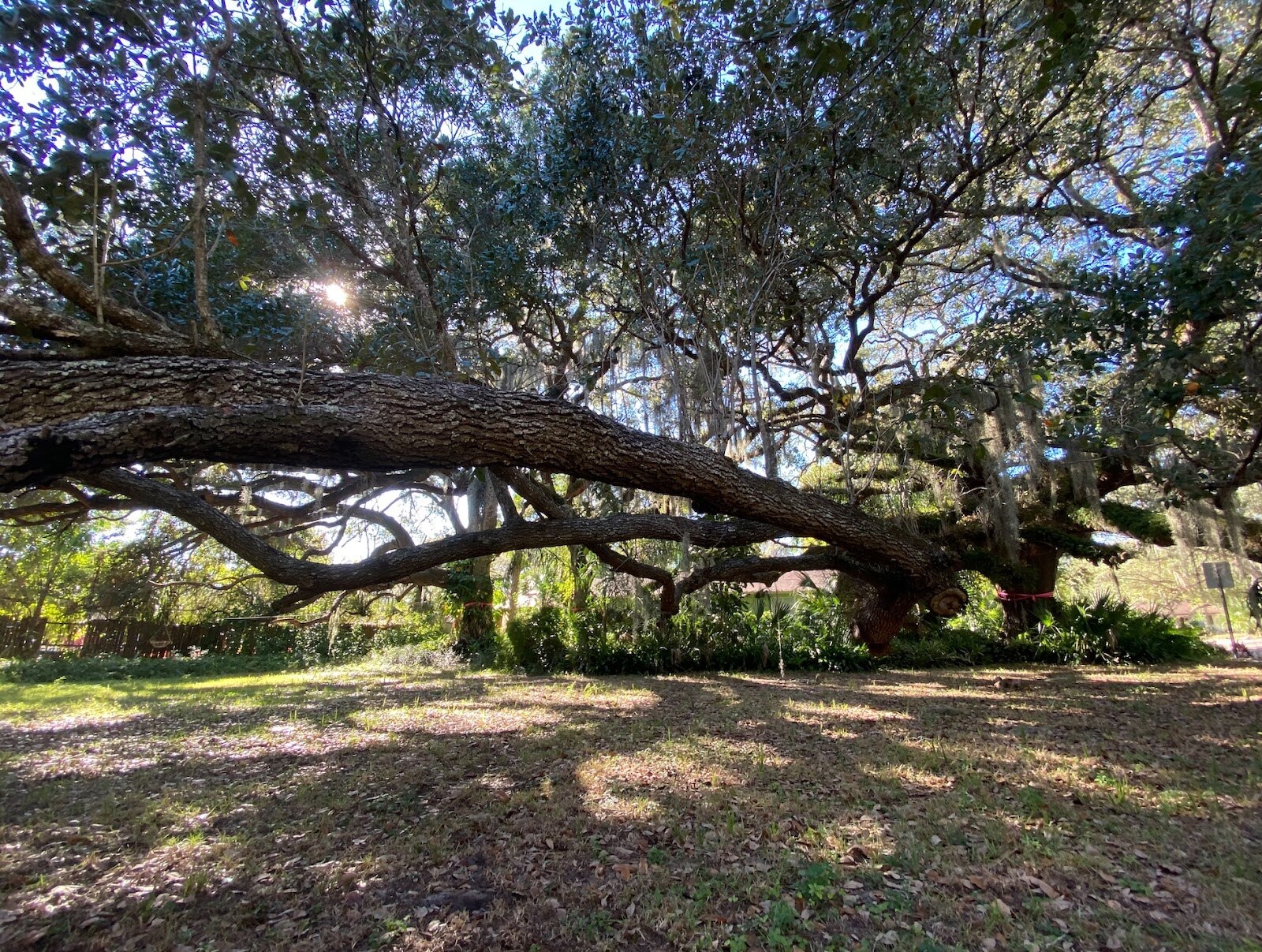
This magnificent oak tree, covered in epiphytes, is several hundred years old and supports numerous native organisms.2 But it’s on a large lot in a neighborhood where housing prices have gone crazy, and the developer who has bought the lot has decided to divide it into 5 parcels and sell each off individually. Two of those five parcels, however, will have this giant tree in the middle of them. So the tree is marked for death. The city government, which would like to protect the tree, is powerless to do so thanks to the Republican law.. The only option would be for the city to try to buy the land from the developer—which it can’t afford to do.
Here we see the brutal and absurd “logic” of the free market in action. A tree can stand for 200 years, 500 years, whatever. It can bring endless joy and benefits to neighborhood residents, human and nonhuman. But because the tree is assumed to be the “property”3of the person who owns the land, and trees have no “right to life” despite being living things, the property owner has the unilateral authority to make a decision that affects the whole neighborhood, even though by doing so they might deprive everyone else of a benefit they have had for centuries (the benefit of a shady street). In a democracy, of course, the neighbors would get to vote on a decision that had consequences for them all. A tree like this should be considered a public asset, one that cannot be “owned” by any individual but whose fate has to be considered through a democratic process that considers all of the stakeholders. But that is not how “rule by markets” works. In rule by markets, the person who can afford to buy something decides what happens to it. It doesn’t matter how much I might value the tree. I might value it far more than the developer values the additional money they get from squeezing two more houses onto a lot. The tree might mean the world to me or to some other form of life. But in a market, the only thing that matters is whether I have enough cash to spend to protect the things I value. If I don’t, and destroying them makes somebody a lot of money, then they will be destroyed.

Radical “propertarianism” is at the heart of Republican Party politics. There is no such thing as a good regulation, and every restriction on what people (or corporations) can do with their property is an infringement on liberty. Combine this with the belief that the pursuit of profit above all other values is a legitimate or even socially valuable goal, and you can see that a world in which the right holds power is a world which will be radically transformed to serve the interests of the wealthy. (The situation is only slightly better under the present Democratic Party.)
Those interests do not include the protection of the natural world. If it was up to developers, huge swaths of our national parks would have been flattened years ago and transformed into shopping, dining, and hotel complexes, or mined for their natural resources. A profiteer, looking at an elephant, does not see a majestic creature we have an obligation to conserve, but a pair of tusks that can be turned into piano keys, and feet that can become a wastebasket. Animals, rainforests, oak trees: they have no intrinsic value that needs to be respected. They only have market value, and in a market their destruction might turn out to be far more “valuable” than their preservation. I am only talking here about direct destruction by property owners of that which they “own.”4
Even when animals are not actually being directly slaughtered, the fact that they have few legal rights means that their lives and habitations can be “collateral damage” of development. Hence horrifying events like the mass murder of koalas by landowners. Due to a combination of habitat destruction (often for development purposes), murder by cats, and collisions with buildings, among other causes, North American bird populations have been in catastrophic decline for decades, with even common birds vanishing and creating “silent skies.” As birds disappear in the course of “normal” human activities, many people do not witness—or consider—the suffering of animals in the competition for ever-diminishing resources.
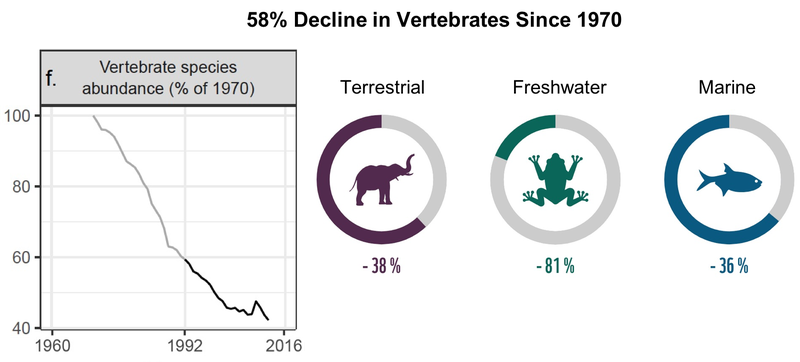
Source: WWF Living Plant Report (2016), via Jeremy Lent
Worse, thanks to what is called “shifting baseline syndrome,” changes that initially seem extreme come to be accepted as normal over time. The next generation of children, who will never remember how many birds (or butterflies or hedgehogs or manatees) once existed in the wild, will not hear anything eerie in the silence. Once a mass murder is complete, its victims tell no tales. When humans killed the last of the giant “Steller sea cows” several hundred years ago, the memory of these mega-manatees faded away quickly, and now they seem like something fantastical. We know that “in just over 100 years the world lost as much forest as it had in the previous 9,000 years,” but when nobody is left alive who remembers the old forests, the loss is not felt.
Increasingly, we live in sterile places with little access to nature. I worry that children will be raised without finding it strange to live in a world of highways, without shade trees or wilderness. Unconscious of how incredible the natural world once was, and without firsthand experience of it, they will destroy what is left of it without even noticing what they are doing.
There is no easy fix for the obliteration of nature. While we must restore land when and where we can, that is no substitute for conserving the natural world as it is. And we can see how political decisions have direct consequences. If Ron DeSantis had not narrowly won the Florida governorship, there would be no new law allowing developers to cut down old oak trees, and the city would be able to require that only three houses be built on this strip of land rather than five. I am no fan of the mainstream Democratic Party, but these are the sorts of changes that occur when psychopathic Republicans beat disappointing centrist Democrats, and are the reason why it’s important to keep the right out of office even as we work to overthrow the current leadership of the Democratic Party.
One important way to improve conservation is to make sure children are actually taught about the world around them. I went to one of the best public schools in Florida, and I never once had to take a course on the identification of plants and animals. I am ashamed of my own ignorance of the world around me; if you point to a tree that I walk by every day, chances are I can’t tell you what kind of tree it is. Anthropomorphic animals fill children’s picture books, but there is much less training on how to interact with animals, how to raise plants, how to understand and care for nature. Gardening and birding should be just as much a part of a primary school education as geography and algebra. School campuses should all have gardens and farms and wilderness areas. The first step toward not exterminating life on Earth is to make sure the next generation of humans understands and appreciates life on Earth. Plants and animals do not possess property, and are only economically valued to the extent they are useful to human beings. This means that to the extent the “market” decides their fate, we can expect to see the natural world further obliterated, because much of it is not useful to human beings5and in fact gets in the way of “development.”6 To stop the present trend from wiping out some of the most miraculous creations on Earth, we need a new commitment to conservation, and to fighting the economic forces that, left unchecked, will obliterate so much of what makes this planet a wondrous place to live.
Since an argument can be made that all trees are a “danger” in a hurricane, the law’s requirement deliberately makes it nearly impossible to thwart a developer who wants to cut down any tree. ↩
Songbirds, especially migrating warblers, depend on oak chenier for survival as well, particularly along the Gulf Coast. ↩
Even tax credits that keep land from being developed are still based on the supremacy of private property rights. ↩
The destruction by the wealthy of that which they do not own, a core feature of the climate catastrophe, is a whole other issue. ↩
Usefulness is subject to debate, as much research has found that spending time in nature confers psychological benefits to humans. ↩
I put development in quotes because it is a propaganda term designed to present certain kinds of changes/alterations as “progress,” as if they are natural and inevitable and any attempt to stop them is regressive. Beware the rhetoric of development! ↩




